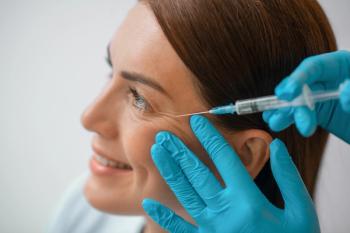
- Balancing Act: Aesthetic Authority Vol.1: No.3
- Volume 1
- Issue 3
Is the Pandemic an Anti-Ager?
Despite the COVID-19 negatives, Dr. Jeffrey Dover believes it may be responsible for resetting the standard American beauty regimen.
I can’t tell you how often this scenario happens with patients who come in for their first medical or cosmetic dermatology appointments since the pandemic began.
They think they look terrible.
“I’ve never looked this bad,” many of them say.
I look at them and say, “You’ve never looked this good.”
These are patients I’ve known for years.
They sheepishly say, “Really?”
“Your skin is brighter. Your eyes are brighter. Your hair is a little longer. You look prettier, more refreshed. You definitely look younger. You look rested,” I say.
It’s a genuine response. And it seems as though every colleague I’ve spoken with about it sees the same thing in their practices.
Brooke C. Sikora, MD, who practices with me in Chestnut Hill, Mass., agrees.
“Many patients despite not having had any recent cosmetic procedures look better than ever,” Dr. Sikora says. “I think this may be multifactorial. For many, the pandemic has slowed down life in a way with less commuting, less travel, and, for some, less stress. Being quarantined has allowed many to develop better at-home skin care routines, exercise more, eat healthier and sleep more. All of these things lead to a healthier, more rested appearance.”
According to Nazanin Saedi, MD, associate professor of dermatology and director of laser surgery and cosmetic dermatology at Thomas Jefferson University, it’s not surprising that patients, themselves, don’t realize how good they look.
“Patients have become more critical of themselves because they are at home longer or looking at themselves more on Zoom,” Dr. Saedi says. “Their skin does look healthier because I think most people have had more time to be compliant with their skincare plans.”
However, she has had a different observation than I when it comes to hair.
“As for hair, I think that is one area that we are seeing more of a concern because of stress-related hair loss (telogen effluvium), where people notice a lot of hair loss after a stressful event,” according to Dr. Saedi.
As life goes back to normal, we’ll see whether these observations continue. But it seems logical that the pandemic effect of living a slower lifestyle might in itself offer antiaging benefits.
Patients who are visiting the office as the summer comes to an end arrive having to grapple with less traffic. They don’t have to wait for their appointments. And while many have financial and other stresses from COVID-19, many people don’t. They’re working from home and have more money to spend since they’re not spending on travel and socializing.
These are my thoughts. I realize they don’t apply to everyone.
I would say 98% of my patients fall into this category of looking better now than they did before the pandemic. A couple of patients come to mind who look worse. Both were unbelievably stressed during the pandemic. One, who holds an important position at a Department of Health, worked 15 hours a day for 91 straight days when COVID-19 was announced. She is unwell and her face shows it.
For the remaining 98%, when I tell them how good they look, they feel joyful. They think about it and begin to see it, too.
More Natural, Less Fuss
The standards of beautification have changed in America, irrevocably. And aesthetic practices are at the frontlines of the new normal.
We’ve been going in the direction of more “natural” change in aesthetics for many years, but the pandemic has taken that up a notch with an emphasis on simplicity.
Botox and fillers have now joined skincare, makeup, hair, and nails as the standard in maintaining beauty. It’s not extraordinary. It’s not way out of whack. It’s not only for the ultra-rich or ultra-crazy or the ultra-vain. For many, it’s mandatory, much like exercising or eating a healthy diet.
We’ll see these patients three times a year, let’s say. So far, business is good. Patients have been lining up to get these treatments since we reopened in July.
From what I’m hearing, patients think they’re getting exquisite results and can go right back to where they were and what they were doing before they had the 5- or 10-minute procedures.
Dr. Sikora agrees.
“Patients these days are focused on prevention and prejuvenation and have a routine that includes maintenance treatments,” she says.
Dr. Saedi adds laser treatments for skin texture to the must-have beauty maintenance regimen, and she agrees that the pandemic has reset the new beauty normal to more natural, less fuss.
There’s plenty of bad that came out of COVID-19, but we don’t hear enough about the good. This, I believe, is a win-win for patients and aesthetic providers.
Dermatologist Jeffrey S. Dover, MD, practices with 14 dermatologists and nearly 100 staff at SkinCare Physicians in Chestnut Hill, Mass.
Articles in this issue
over 5 years ago
Unlock Your Profit Potential with the Revolutionary PRX Protocolover 5 years ago
Strategies for A Successful Hair Practiceover 5 years ago
Starting a Hair Practiceover 5 years ago
Balancing Act: Aesthetic Authority Vol.1: No.3over 5 years ago
Strength and Success in Our Specialtyover 5 years ago
Patient Maskne Prevention Tipsover 5 years ago
Maskne Treatment Protocolover 5 years ago
Treating Maskne Inside and Outover 5 years ago
Examining CBD Skin Benefitsover 5 years ago
A Closer Look at CBDNewsletter
Like what you’re reading? Subscribe to Dermatology Times for weekly updates on therapies, innovations, and real-world practice tips.











